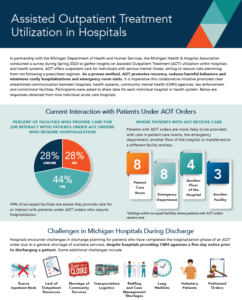The MHA is hosting a five-part webinar series to provide hospital staff with a deeper understanding of Michigan’s behavioral health system and the hospital’s role in connecting patients with care. These webinars are part of the MHA’s continued investment in behavioral health, a key priority in its strategic action plan and advocacy and policy efforts. The series will provide hospitals with strategies to navigate the current system, strengthen partnerships and identify innovative solutions for overcoming many challenges in management of patients with behavioral health needs.
The next webinar in the series is Wednesday, April 17 at 1 p.m.
April 17: Navigating Challenges
The webinar will address the dispute and resolution process and the voluntary and involuntary commitment process.
May 8: Innovative Strategies to Address the Behavioral Health Crisis in Michigan Hospitals – Part 1
Will offer innovative solutions that hospitals and health system partners across the state are using to manage and treat behavioral health patients.
June 12: Innovative Strategies to Address the Behavioral Health Crisis in Michigan Hospitals – Part 2
Will offer additional innovative solutions that hospitals and health system partners across the state are using to manage and treat behavioral health patients.
Registration is free and open to MHA-members only. The series will be relevant to any employee working closely with behavioral health patients who are part of the CMH/PIHP contracting process or work with community organizations to support patient’s behavioral health needs at the time of discharge.
Members with questions on the webinar series may contact Kelsey Ostergren at the MHA. Members with questions on the MHA behavioral health strategy may contact Lauren LaPine at the MHA.


